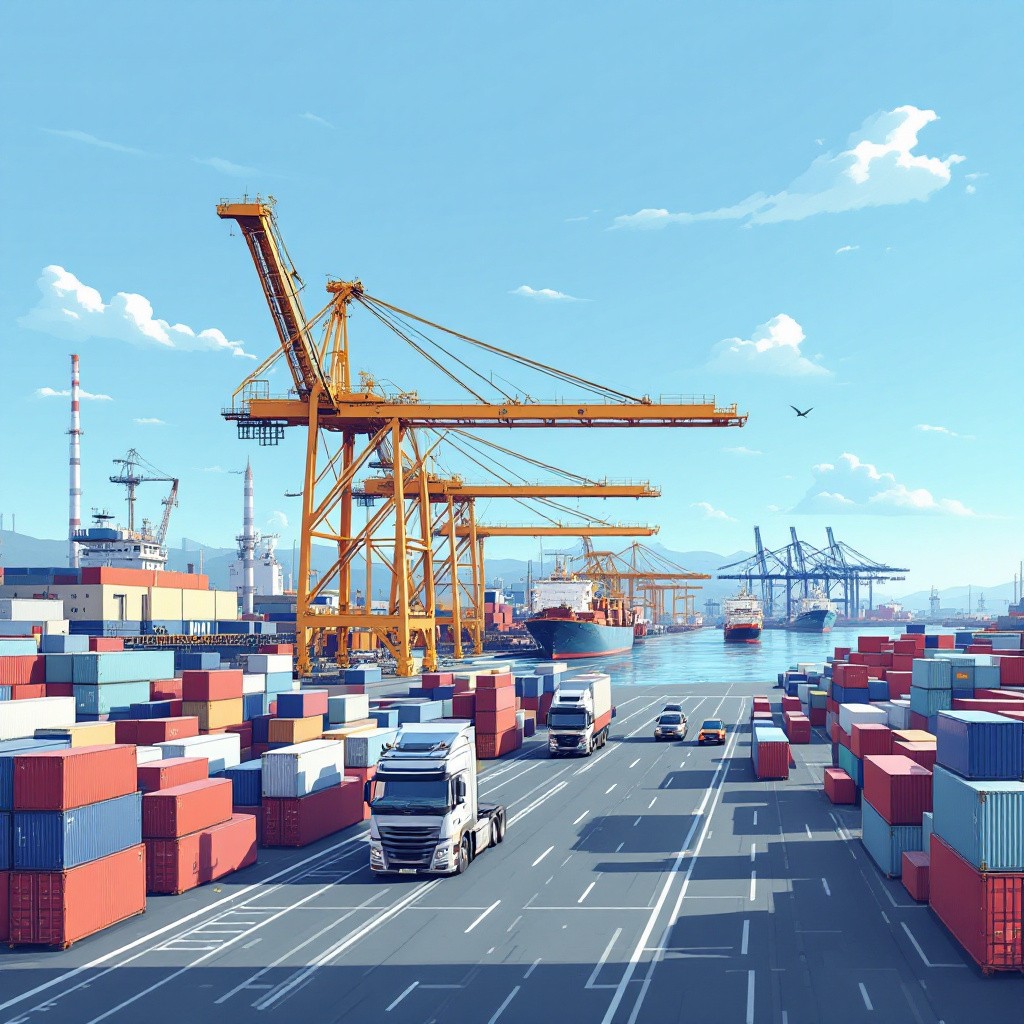
Insights
October 15, 2024
£1 Billion UK Investment Under Threat: How Criticism of P&O Ferries Could Impact Logistics and Infrastructure

Insights
October 15, 2024
£1 Billion UK Investment Under Threat: How Criticism of P&O Ferries Could Impact Logistics and Infrastructure
A logistics firm has threatened to withdraw a £1 billion investment in the UK after receiving criticism from the UK Transport Secretary regarding P&O Ferries. The potential withdrawal could have far-reaching consequences for the UK’s infrastructure, logistics, and job creation sectors, sparking concerns within the industry.
The UK logistics and transport industry is on high alert after a prominent logistics firm threatened to withdraw a £1 billion investment following comments made by the UK Transport Secretary regarding P&O Ferries. The dispute has cast a shadow over potential infrastructure improvements, job creation, and economic growth within the sector. With such a substantial investment at risk, the logistics landscape in the UK may face significant challenges, creating uncertainty for the industry’s future.
This blog explores the background of the dispute, the potential impact of the withdrawal, and what this means for the future of UK logistics, infrastructure, and employment.
The Dispute: A Clash Between the Transport Secretary and P&O Ferries
The issue began when the UK Transport Secretary made critical remarks about P&O Ferries, a well-known ferry operator within the UK and Europe. The comments stemmed from a broader controversy surrounding P&O’s labor practices and operational decisions, which sparked backlash from both government officials and the public. While the Transport Secretary aimed to address concerns regarding worker treatment and safety standards, the criticism has reverberated across the wider logistics and transportation industry.
A key logistics firm, which had been planning to invest £1 billion into UK infrastructure, including ports, warehouses, and freight facilities, responded to the Transport Secretary’s comments by threatening to pull its investment. The company, which remains unnamed, cited concerns over the political and regulatory environment, indicating that the UK government’s actions may be creating an unstable investment climate.
Potential Impact on UK Logistics and Infrastructure
The threat to withdraw this £1 billion investment has raised alarms within the logistics and transport sectors, with stakeholders expressing concerns about the broader implications. Here are the key areas where this could have the most significant impact:
1. Infrastructure Development Delays
A £1 billion investment represents a substantial contribution to the development of UK infrastructure, particularly in the logistics sector. The investment was expected to fund projects aimed at upgrading port facilities, improving freight handling capabilities, and modernizing warehouse operations.
Without this financial injection, critical infrastructure projects could face delays or even cancellation. This could hamper the UK’s ability to remain competitive in the global logistics market, where efficient and modern infrastructure is essential for managing high-volume trade and freight.
2. Job Creation Stalled
The logistics and transport sector is one of the largest employers in the UK, with millions of jobs directly tied to the movement of goods across the country. The planned investment was projected to create thousands of new jobs, particularly in ports, warehousing, and freight handling.
The withdrawal of this investment would not only affect the immediate job creation plans but could also slow long-term employment growth within the sector. This could be especially detrimental in regions heavily reliant on logistics hubs and ports for employment opportunities, such as Liverpool, Dover, and Felixstowe.
3. Reduced Competitiveness in Global Logistics
The UK is a major player in global logistics, largely due to its geographical location and its advanced freight infrastructure. However, to maintain its competitive edge, the country must continuously invest in upgrading its ports, transportation networks, and warehousing capabilities.
A withdrawal of investment at this scale would likely reduce the UK’s competitiveness in the global logistics market. With fewer resources dedicated to improving the nation’s logistical infrastructure, international businesses may begin to favor other locations for their supply chain operations, reducing the UK’s role as a key logistics hub.
4. Disruption to Supply Chains
A reduction in logistics infrastructure investments could also lead to disruptions in supply chains. Ports and warehouses are essential for managing the flow of goods into and out of the UK. With fewer resources allocated to infrastructure improvements, the logistics sector may face bottlenecks, delays, and inefficiencies in the handling of goods.
For industries that rely on just-in-time supply chains, such as automotive manufacturing and retail, these disruptions could lead to increased costs and inventory shortages.
Political and Regulatory Concerns
The logistics firm’s threat to withdraw investment has highlighted a growing concern within the sector regarding the political and regulatory environment in the UK. In recent years, government criticism and policy shifts have created uncertainty for businesses operating in the logistics space.
While the Transport Secretary’s comments about P&O Ferries were aimed at addressing specific concerns about labor practices, the ripple effects have been felt across the industry. Logistics companies, particularly those with significant investments at stake, may now be questioning whether the UK government’s stance on labor and regulatory issues will create headwinds for future projects.
Moreover, there are concerns that the government’s regulatory actions may create additional costs for logistics firms, particularly those operating across borders. With the UK now outside the EU, companies are already grappling with new customs procedures and regulatory hurdles, which add complexity to international trade.
Why Investment in Logistics Is Crucial
The logistics industry is one of the cornerstones of the UK economy, facilitating the movement of goods both domestically and internationally. As consumer demand grows, so too does the need for efficient logistics infrastructure that can support e-commerce, global trade, and supply chain management.
The ongoing transition toward autonomous trucks, electric freight vehicles, and sustainable logistics practices further underscores the need for robust infrastructure. Investment in ports, electric vehicle (EV) charging stations, and smart logistics hubs will be critical to the UK’s ability to modernize its logistics sector and meet the demands of a sustainable future.
Moving Forward: What Can Be Done?
The potential withdrawal of a £1 billion investment is a serious concern for the UK’s logistics and transport sectors. However, there are steps that the government, industry stakeholders, and logistics companies can take to mitigate the impact and prevent further uncertainty.
1. Strengthen Public-Private Partnerships
One way to secure future investment is by fostering stronger public-private partnerships. The government can work more closely with logistics companies to ensure that the regulatory environment is stable and conducive to growth. These partnerships could also help create more targeted investments that benefit both businesses and the broader UK economy.
2. Enhance Regulatory Transparency
Logistics companies are looking for certainty when it comes to regulatory frameworks. The government should aim to provide clearer guidelines on labor practices, customs regulations, and environmental standards to reduce the ambiguity that currently surrounds the sector.
By ensuring that the regulatory landscape is predictable, the UK can create a more attractive environment for foreign and domestic investors in the logistics industry.
3. Encourage Sustainable Investments
The UK government has made significant strides toward promoting sustainability in logistics. Encouraging investments in green logistics and sustainable infrastructure could help attract capital and secure the future of the industry.
Logistics companies are increasingly focused on reducing emissions, transitioning to electric vehicles, and implementing carbon-neutral supply chains. By incentivizing sustainable investments, the UK can align with global trends and secure a leadership position in green logistics.
Conclusion
The threat to withdraw a £1 billion investment from the UK logistics sector is a stark reminder of the importance of maintaining a stable and supportive regulatory environment. With so much at stake—ranging from infrastructure development to job creation—the government and industry must work together to address concerns and ensure that the UK remains an attractive destination for logistics investments.
As the UK navigates its post-Brexit landscape, the logistics sector will continue to play a crucial role in facilitating trade and driving economic growth. By fostering public-private collaboration, enhancing regulatory transparency, and focusing on sustainable logistics solutions, the UK can mitigate the risks of investment withdrawal and build a more resilient logistics industry for the future.
The UK logistics and transport industry is on high alert after a prominent logistics firm threatened to withdraw a £1 billion investment following comments made by the UK Transport Secretary regarding P&O Ferries. The dispute has cast a shadow over potential infrastructure improvements, job creation, and economic growth within the sector. With such a substantial investment at risk, the logistics landscape in the UK may face significant challenges, creating uncertainty for the industry’s future.
This blog explores the background of the dispute, the potential impact of the withdrawal, and what this means for the future of UK logistics, infrastructure, and employment.
The Dispute: A Clash Between the Transport Secretary and P&O Ferries
The issue began when the UK Transport Secretary made critical remarks about P&O Ferries, a well-known ferry operator within the UK and Europe. The comments stemmed from a broader controversy surrounding P&O’s labor practices and operational decisions, which sparked backlash from both government officials and the public. While the Transport Secretary aimed to address concerns regarding worker treatment and safety standards, the criticism has reverberated across the wider logistics and transportation industry.
A key logistics firm, which had been planning to invest £1 billion into UK infrastructure, including ports, warehouses, and freight facilities, responded to the Transport Secretary’s comments by threatening to pull its investment. The company, which remains unnamed, cited concerns over the political and regulatory environment, indicating that the UK government’s actions may be creating an unstable investment climate.
Potential Impact on UK Logistics and Infrastructure
The threat to withdraw this £1 billion investment has raised alarms within the logistics and transport sectors, with stakeholders expressing concerns about the broader implications. Here are the key areas where this could have the most significant impact:
1. Infrastructure Development Delays
A £1 billion investment represents a substantial contribution to the development of UK infrastructure, particularly in the logistics sector. The investment was expected to fund projects aimed at upgrading port facilities, improving freight handling capabilities, and modernizing warehouse operations.
Without this financial injection, critical infrastructure projects could face delays or even cancellation. This could hamper the UK’s ability to remain competitive in the global logistics market, where efficient and modern infrastructure is essential for managing high-volume trade and freight.
2. Job Creation Stalled
The logistics and transport sector is one of the largest employers in the UK, with millions of jobs directly tied to the movement of goods across the country. The planned investment was projected to create thousands of new jobs, particularly in ports, warehousing, and freight handling.
The withdrawal of this investment would not only affect the immediate job creation plans but could also slow long-term employment growth within the sector. This could be especially detrimental in regions heavily reliant on logistics hubs and ports for employment opportunities, such as Liverpool, Dover, and Felixstowe.
3. Reduced Competitiveness in Global Logistics
The UK is a major player in global logistics, largely due to its geographical location and its advanced freight infrastructure. However, to maintain its competitive edge, the country must continuously invest in upgrading its ports, transportation networks, and warehousing capabilities.
A withdrawal of investment at this scale would likely reduce the UK’s competitiveness in the global logistics market. With fewer resources dedicated to improving the nation’s logistical infrastructure, international businesses may begin to favor other locations for their supply chain operations, reducing the UK’s role as a key logistics hub.
4. Disruption to Supply Chains
A reduction in logistics infrastructure investments could also lead to disruptions in supply chains. Ports and warehouses are essential for managing the flow of goods into and out of the UK. With fewer resources allocated to infrastructure improvements, the logistics sector may face bottlenecks, delays, and inefficiencies in the handling of goods.
For industries that rely on just-in-time supply chains, such as automotive manufacturing and retail, these disruptions could lead to increased costs and inventory shortages.
Political and Regulatory Concerns
The logistics firm’s threat to withdraw investment has highlighted a growing concern within the sector regarding the political and regulatory environment in the UK. In recent years, government criticism and policy shifts have created uncertainty for businesses operating in the logistics space.
While the Transport Secretary’s comments about P&O Ferries were aimed at addressing specific concerns about labor practices, the ripple effects have been felt across the industry. Logistics companies, particularly those with significant investments at stake, may now be questioning whether the UK government’s stance on labor and regulatory issues will create headwinds for future projects.
Moreover, there are concerns that the government’s regulatory actions may create additional costs for logistics firms, particularly those operating across borders. With the UK now outside the EU, companies are already grappling with new customs procedures and regulatory hurdles, which add complexity to international trade.
Why Investment in Logistics Is Crucial
The logistics industry is one of the cornerstones of the UK economy, facilitating the movement of goods both domestically and internationally. As consumer demand grows, so too does the need for efficient logistics infrastructure that can support e-commerce, global trade, and supply chain management.
The ongoing transition toward autonomous trucks, electric freight vehicles, and sustainable logistics practices further underscores the need for robust infrastructure. Investment in ports, electric vehicle (EV) charging stations, and smart logistics hubs will be critical to the UK’s ability to modernize its logistics sector and meet the demands of a sustainable future.
Moving Forward: What Can Be Done?
The potential withdrawal of a £1 billion investment is a serious concern for the UK’s logistics and transport sectors. However, there are steps that the government, industry stakeholders, and logistics companies can take to mitigate the impact and prevent further uncertainty.
1. Strengthen Public-Private Partnerships
One way to secure future investment is by fostering stronger public-private partnerships. The government can work more closely with logistics companies to ensure that the regulatory environment is stable and conducive to growth. These partnerships could also help create more targeted investments that benefit both businesses and the broader UK economy.
2. Enhance Regulatory Transparency
Logistics companies are looking for certainty when it comes to regulatory frameworks. The government should aim to provide clearer guidelines on labor practices, customs regulations, and environmental standards to reduce the ambiguity that currently surrounds the sector.
By ensuring that the regulatory landscape is predictable, the UK can create a more attractive environment for foreign and domestic investors in the logistics industry.
3. Encourage Sustainable Investments
The UK government has made significant strides toward promoting sustainability in logistics. Encouraging investments in green logistics and sustainable infrastructure could help attract capital and secure the future of the industry.
Logistics companies are increasingly focused on reducing emissions, transitioning to electric vehicles, and implementing carbon-neutral supply chains. By incentivizing sustainable investments, the UK can align with global trends and secure a leadership position in green logistics.
Conclusion
The threat to withdraw a £1 billion investment from the UK logistics sector is a stark reminder of the importance of maintaining a stable and supportive regulatory environment. With so much at stake—ranging from infrastructure development to job creation—the government and industry must work together to address concerns and ensure that the UK remains an attractive destination for logistics investments.
As the UK navigates its post-Brexit landscape, the logistics sector will continue to play a crucial role in facilitating trade and driving economic growth. By fostering public-private collaboration, enhancing regulatory transparency, and focusing on sustainable logistics solutions, the UK can mitigate the risks of investment withdrawal and build a more resilient logistics industry for the future.
A logistics firm has threatened to withdraw a £1 billion investment in the UK after receiving criticism from the UK Transport Secretary regarding P&O Ferries. The potential withdrawal could have far-reaching consequences for the UK’s infrastructure, logistics, and job creation sectors, sparking concerns within the industry.
The UK logistics and transport industry is on high alert after a prominent logistics firm threatened to withdraw a £1 billion investment following comments made by the UK Transport Secretary regarding P&O Ferries. The dispute has cast a shadow over potential infrastructure improvements, job creation, and economic growth within the sector. With such a substantial investment at risk, the logistics landscape in the UK may face significant challenges, creating uncertainty for the industry’s future.
This blog explores the background of the dispute, the potential impact of the withdrawal, and what this means for the future of UK logistics, infrastructure, and employment.
The Dispute: A Clash Between the Transport Secretary and P&O Ferries
The issue began when the UK Transport Secretary made critical remarks about P&O Ferries, a well-known ferry operator within the UK and Europe. The comments stemmed from a broader controversy surrounding P&O’s labor practices and operational decisions, which sparked backlash from both government officials and the public. While the Transport Secretary aimed to address concerns regarding worker treatment and safety standards, the criticism has reverberated across the wider logistics and transportation industry.
A key logistics firm, which had been planning to invest £1 billion into UK infrastructure, including ports, warehouses, and freight facilities, responded to the Transport Secretary’s comments by threatening to pull its investment. The company, which remains unnamed, cited concerns over the political and regulatory environment, indicating that the UK government’s actions may be creating an unstable investment climate.
Potential Impact on UK Logistics and Infrastructure
The threat to withdraw this £1 billion investment has raised alarms within the logistics and transport sectors, with stakeholders expressing concerns about the broader implications. Here are the key areas where this could have the most significant impact:
1. Infrastructure Development Delays
A £1 billion investment represents a substantial contribution to the development of UK infrastructure, particularly in the logistics sector. The investment was expected to fund projects aimed at upgrading port facilities, improving freight handling capabilities, and modernizing warehouse operations.
Without this financial injection, critical infrastructure projects could face delays or even cancellation. This could hamper the UK’s ability to remain competitive in the global logistics market, where efficient and modern infrastructure is essential for managing high-volume trade and freight.
2. Job Creation Stalled
The logistics and transport sector is one of the largest employers in the UK, with millions of jobs directly tied to the movement of goods across the country. The planned investment was projected to create thousands of new jobs, particularly in ports, warehousing, and freight handling.
The withdrawal of this investment would not only affect the immediate job creation plans but could also slow long-term employment growth within the sector. This could be especially detrimental in regions heavily reliant on logistics hubs and ports for employment opportunities, such as Liverpool, Dover, and Felixstowe.
3. Reduced Competitiveness in Global Logistics
The UK is a major player in global logistics, largely due to its geographical location and its advanced freight infrastructure. However, to maintain its competitive edge, the country must continuously invest in upgrading its ports, transportation networks, and warehousing capabilities.
A withdrawal of investment at this scale would likely reduce the UK’s competitiveness in the global logistics market. With fewer resources dedicated to improving the nation’s logistical infrastructure, international businesses may begin to favor other locations for their supply chain operations, reducing the UK’s role as a key logistics hub.
4. Disruption to Supply Chains
A reduction in logistics infrastructure investments could also lead to disruptions in supply chains. Ports and warehouses are essential for managing the flow of goods into and out of the UK. With fewer resources allocated to infrastructure improvements, the logistics sector may face bottlenecks, delays, and inefficiencies in the handling of goods.
For industries that rely on just-in-time supply chains, such as automotive manufacturing and retail, these disruptions could lead to increased costs and inventory shortages.
Political and Regulatory Concerns
The logistics firm’s threat to withdraw investment has highlighted a growing concern within the sector regarding the political and regulatory environment in the UK. In recent years, government criticism and policy shifts have created uncertainty for businesses operating in the logistics space.
While the Transport Secretary’s comments about P&O Ferries were aimed at addressing specific concerns about labor practices, the ripple effects have been felt across the industry. Logistics companies, particularly those with significant investments at stake, may now be questioning whether the UK government’s stance on labor and regulatory issues will create headwinds for future projects.
Moreover, there are concerns that the government’s regulatory actions may create additional costs for logistics firms, particularly those operating across borders. With the UK now outside the EU, companies are already grappling with new customs procedures and regulatory hurdles, which add complexity to international trade.
Why Investment in Logistics Is Crucial
The logistics industry is one of the cornerstones of the UK economy, facilitating the movement of goods both domestically and internationally. As consumer demand grows, so too does the need for efficient logistics infrastructure that can support e-commerce, global trade, and supply chain management.
The ongoing transition toward autonomous trucks, electric freight vehicles, and sustainable logistics practices further underscores the need for robust infrastructure. Investment in ports, electric vehicle (EV) charging stations, and smart logistics hubs will be critical to the UK’s ability to modernize its logistics sector and meet the demands of a sustainable future.
Moving Forward: What Can Be Done?
The potential withdrawal of a £1 billion investment is a serious concern for the UK’s logistics and transport sectors. However, there are steps that the government, industry stakeholders, and logistics companies can take to mitigate the impact and prevent further uncertainty.
1. Strengthen Public-Private Partnerships
One way to secure future investment is by fostering stronger public-private partnerships. The government can work more closely with logistics companies to ensure that the regulatory environment is stable and conducive to growth. These partnerships could also help create more targeted investments that benefit both businesses and the broader UK economy.
2. Enhance Regulatory Transparency
Logistics companies are looking for certainty when it comes to regulatory frameworks. The government should aim to provide clearer guidelines on labor practices, customs regulations, and environmental standards to reduce the ambiguity that currently surrounds the sector.
By ensuring that the regulatory landscape is predictable, the UK can create a more attractive environment for foreign and domestic investors in the logistics industry.
3. Encourage Sustainable Investments
The UK government has made significant strides toward promoting sustainability in logistics. Encouraging investments in green logistics and sustainable infrastructure could help attract capital and secure the future of the industry.
Logistics companies are increasingly focused on reducing emissions, transitioning to electric vehicles, and implementing carbon-neutral supply chains. By incentivizing sustainable investments, the UK can align with global trends and secure a leadership position in green logistics.
Conclusion
The threat to withdraw a £1 billion investment from the UK logistics sector is a stark reminder of the importance of maintaining a stable and supportive regulatory environment. With so much at stake—ranging from infrastructure development to job creation—the government and industry must work together to address concerns and ensure that the UK remains an attractive destination for logistics investments.
As the UK navigates its post-Brexit landscape, the logistics sector will continue to play a crucial role in facilitating trade and driving economic growth. By fostering public-private collaboration, enhancing regulatory transparency, and focusing on sustainable logistics solutions, the UK can mitigate the risks of investment withdrawal and build a more resilient logistics industry for the future.
Other Blogs
Other Blogs
Check our other project Blogs with useful insight and information for your businesses
Other Blogs
Other Blogs
Check our other project Blogs with useful insight and information for your businesses
Other Blogs
Other Blogs
Check our other project Blogs with useful insight and information for your businesses


